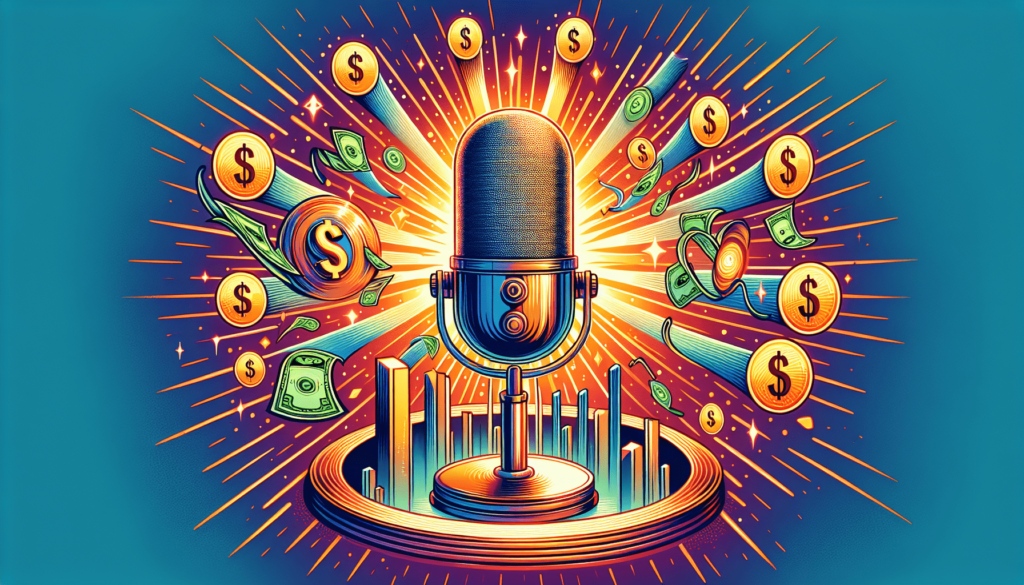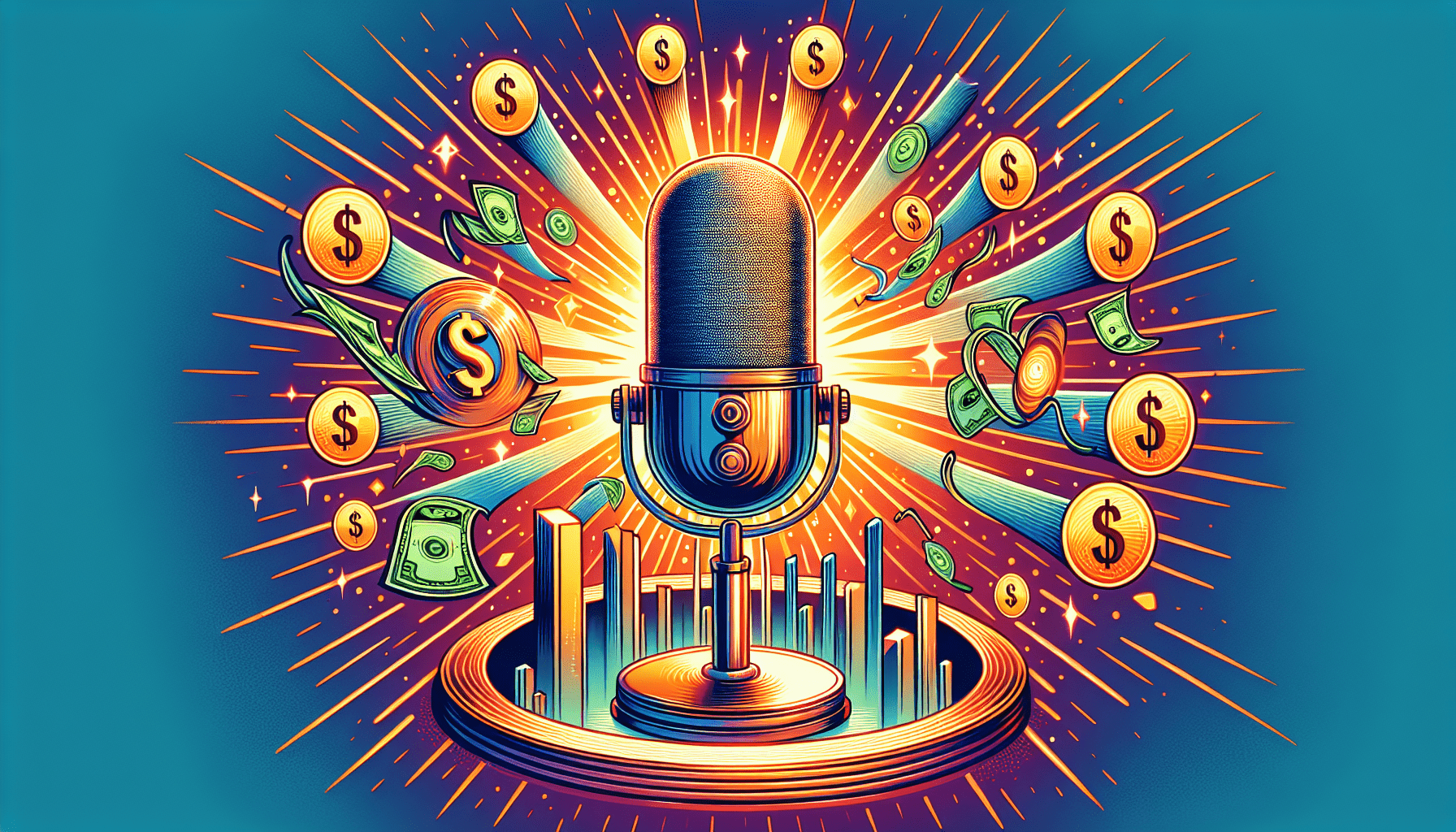Are you ready to unlock the secrets to a successful podcast and monetization? At BackersHub.com, we understand the power of innovation, connection, and capitalizing on possibilities. Starting a podcast might seem daunting, but with the right strategies, it can become a profitable venture. In this article, we will provide you with valuable insights and practical tips on how to kickstart your podcasting journey and turn it into a lucrative source of income. Get ready to dive into the world of podcasting success!
Unlock Earning Power: My $7 Mega Link Secret Revealed!
Choosing a Topic
Identify your passion and expertise
When starting a podcast, it’s important to choose a topic that you are passionate about and have expertise in. Your passion will keep you motivated and excited about creating content, while your expertise will lend credibility and ensure that you are providing valuable insights to your audience.
Research popular podcast genres
Before finalizing your podcast topic, it’s essential to research popular podcast genres to gain an understanding of what types of content are in high demand. This research will help you identify potential gaps in the market that you can fill with your unique perspective and expertise.
Consider audience demand and competition
While choosing a topic, it’s crucial to consider audience demand and competition. Look for topics that have a significant audience base but are not overly saturated with competitors. This will give you a better chance to stand out and attract a dedicated audience.
Creating Compelling Content
Outline your episodes
Creating a detailed outline for each episode will help you stay organized and ensure that your content flows seamlessly. Start by identifying the main topics and sub-topics you want to cover, and then create a logical structure that will guide your episode’s progression.
Plan engaging segments and interviews
To keep your audience engaged, plan out segments and interviews that add variety and intrigue to your podcast episodes. This could include storytelling segments, guest interviews, Q&A sessions, or even listener participation segments. The key is to provide content that grabs your audience’s attention and keeps them coming back for more.
Utilize storytelling techniques
Storytelling is a powerful tool for engaging listeners and making your content memorable. Incorporate storytelling techniques into your podcast by sharing personal anecdotes, real-life examples, or captivating narratives that relate to your topic. This will help create a deeper connection with your audience and make your podcast stand out from the crowd.
Balance information and entertainment
Finding the right balance between informative content and entertaining elements is crucial for keeping your audience engaged. While it’s important to provide valuable information and insights, don’t forget to inject some entertainment value into your podcast. This could include humor, interesting anecdotes, or engaging discussions that make learning enjoyable for your audience.

Life-Changing: How a Simple Link Brought Me Financial Freedom!
Investing in Quality Equipment
Selecting a reliable microphone
Investing in a reliable microphone is essential to ensure high-quality audio for your podcast. Look for microphones that are specifically designed for podcasting or broadcasting, as they tend to have superior sound capture and noise-canceling capabilities. Consider factors such as USB connectivity, condenser or dynamic microphone options, and compatibility with your recording setup.
Choosing headphones for monitoring
Using headphones for monitoring during the recording process allows you to hear any audio issues or background noise that might affect the quality of your podcast. Look for headphones that provide accurate sound reproduction and comfortable fit to ensure you can focus on the details while recording.
Investing in a good audio interface
An audio interface acts as the intermediary between your microphone and computer, ensuring a clean and professional sound input. Invest in a good audio interface that offers high-quality analog-to-digital conversion, multiple inputs for recording multiple hosts or guests, and adjustable gain control for optimal sound levels.
Considering acoustic treatment for recording space
To create the best audio quality, consider acoustic treatment for your recording space. This can involve adding soundproofing materials to minimize external noise, using diffusers and absorbers to eliminate echoes or reverberations, and optimizing the placement of your microphone and equipment. Proper acoustic treatment will significantly enhance the overall sound quality of your podcast.
Recording and Editing
Finding a quiet recording environment
Finding a quiet and controlled environment for recording is essential to prevent unwanted background noise from interfering with your podcast. Choose a location with minimal outside noise, such as a dedicated quiet room or a well-insulated space. Consider using soundproofing materials or creating a makeshift recording booth to further reduce external disturbances.
Using software for recording and editing
There are numerous software options available for recording and editing your podcast episodes. Choose a user-friendly software that suits your needs and offers features like multi-track recording, noise reduction, equalization, and audio effects. Experiment with different software to find the one that works best for you and your editing style.
Employing noise reduction techniques
When editing your podcast episodes, utilize noise reduction techniques to minimize any background noise or hiss that may have been captured during recording. Most audio editing software includes noise reduction plugins or tools that can help clean up your audio and provide a more professional sound.
Ensuring consistent audio levels
Maintaining consistent audio levels throughout your podcast episodes is important for a pleasant listening experience. Use audio compression and normalization techniques to balance the levels of different tracks and ensure that all voices and sound effects are audible without being too loud or too soft.
Editing out mistakes and improving pacing
During the editing process, listen carefully to your recordings and edit out any mistakes or awkward pauses. This will help improve the overall pacing and flow of your podcast. Pay attention to the timing of transitions, background music, and any additional sound effects to create a seamless listening experience for your audience.

Daily Payday From Your Couch? Try now for the cost of a cup of coffee!
Publishing and Promotion
Choosing a podcast hosting platform
To make your podcast accessible to a wide audience, choose a reliable podcast hosting platform. Look for platforms that offer features like unlimited storage, easy RSS feed generation, analytics tracking, and integration with podcast directories. Consider the pricing plans and additional benefits offered by different hosting platforms before making a decision.
Crafting eye-catching podcast artwork
Creating eye-catching podcast artwork is crucial for attracting potential listeners and standing out in podcast directories. Hire a professional designer or use digital design tools to create visually appealing artwork that reflects your podcast’s theme and captures the attention of your target audience.
Writing keyword-rich titles and descriptions
When publishing your episodes, make sure to write keyword-rich titles and descriptions. This will help your podcast appear in relevant search results and attract more organic traffic. Use relevant keywords that accurately describe your content and consider including key phrases that potential listeners might search for.
Submitting to podcast directories
Maximize your podcast’s reach by submitting it to popular podcast directories such as Apple Podcasts, Spotify, Google Podcasts, and Stitcher. These directories allow your podcast to be discovered by millions of potential listeners worldwide. Follow the submission guidelines provided by each directory to ensure a smooth and successful submission process.
Leveraging social media for promotion
Promote your podcast on social media platforms to increase its visibility and attract a larger audience. Create engaging posts, share snippets of your episodes, and interact with your followers to build a community around your podcast. Consider collaborating with influencers or running targeted ads to reach a wider audience and boost your podcast’s growth.
Building an Engaged Audience
Consistency in release schedule
Consistency in your podcast release schedule is key to building an engaged audience. Choose a frequency that suits your production capabilities and commit to releasing episodes on the same day and time each week or month. Consistency builds trust and anticipation among your listeners, keeping them coming back for new episodes.
Encouraging listener feedback and interaction
Encourage your listeners to provide feedback, share their thoughts, and ask questions. Foster a sense of community by creating dedicated email addresses or social media accounts for listener interaction. Incorporate listener feedback into future episodes to make your audience feel heard and valued.
Responding to audience comments and inquiries
Make an effort to respond to audience comments and inquiries promptly. Engaging with your listeners demonstrates that you appreciate their support and value their input. Whether it’s through direct messages, email, or social media, consistent and meaningful interactions with your audience will help forge a deeper connection.
Collaborating with other podcasters or influencers
Collaborating with fellow podcasters or influencers in your niche can help expand your reach and expose your podcast to new audiences. Consider guest appearances on other podcasts, cross-promotion with complementary shows, or inviting influencers as guests on your own episodes. These collaborations can provide valuable exposure and introduce your podcast to a wider audience.
Shocking! This one link can pay you time and time again!
Monetization Strategies
Sponsorships and advertisements
One of the most common monetization strategies for podcasts is securing sponsorships and running advertisements. This involves partnering with relevant brands or companies and featuring their products or services in your episodes. As your podcast grows and attracts a larger audience, you can negotiate higher rates and secure more lucrative sponsorship deals.
Crowdfunding and donation platforms
Crowdfunding and donation platforms provide an opportunity for your audience to support your podcast financially. Platforms like Patreon or Ko-fi allow listeners to contribute money on a recurring or one-time basis. Offer exclusive bonus content or perks to incentivize donations and show your appreciation for the support.
Premium subscription models
Implementing premium subscription models can provide an additional stream of revenue for your podcast. Offer exclusive access to bonus episodes, behind-the-scenes content, or ad-free listening in exchange for a monthly or annual subscription fee. This model rewards dedicated listeners and generates ongoing revenue for your podcast.
Merchandise sales and brand partnerships
Consider selling merchandise related to your podcast, such as t-shirts, mugs, or stickers. This not only helps promote your podcast but also creates a revenue stream through direct sales. Additionally, explore brand partnerships where you collaborate with relevant companies to create custom merchandise or offer special discounts to your listeners.
Understanding Analytics
Monitoring download and listener statistics
Utilize podcast analytics tools to monitor download and listener statistics. These metrics provide valuable insights into your audience’s behavior, preferences, and growth trends. Track the number of downloads, unique listeners, and engagement metrics like average listening duration to understand how your content resonates with your audience.
Analyzing audience demographics and engagement
Dive deeper into your audience demographics and engagement patterns to tailor your content. Analyze data such as age, location, gender, and listening habits to better understand your target audience. Pay attention to audience engagement metrics such as comments, shares, and reviews to gauge the level of interest and satisfaction among your listeners.
Identifying popular episodes or topics
Through analyzing podcast analytics, identify which episodes or topics resonate most with your audience. This will help you optimize your content strategy, replicate successful episodes, or explore related topics that generate high listener engagement. Use this data to refine your podcast and continually provide content that your audience finds valuable.
Tracking marketing and advertising effectiveness
When implementing marketing and advertising campaigns for your podcast, track their effectiveness using analytics. Monitor the impact of social media promotions, collaborations, or paid advertising efforts by analyzing audience growth, website traffic referrals, and episode downloads. This data will help you make informed decisions when allocating resources for future marketing initiatives.
Unlock Earning Power: My $7 Mega Link Secret Revealed!
Diversifying Income Streams
Creating additional content or spin-off podcasts
Consider creating additional content or spin-off podcasts to diversify your income streams. This could include bonus episodes, exclusive content for premium subscribers, or launching a new podcast under a different topic or format. By offering a variety of content options, you can attract different audience segments and explore alternative monetization opportunities.
Offering consulting or coaching services
Leverage your expertise and podcast audience by offering consulting or coaching services in your niche. This could involve one-on-one coaching sessions, group workshops, or online courses that provide additional value to your audience. Use your podcast as a platform to establish your authority and attract clients who value your knowledge and insights.
Developing online courses or workshops
Creating online courses or workshops related to your podcast topic can be a lucrative revenue stream. Share your expertise through in-depth courses that provide valuable, actionable insights to your audience. Market these courses through your podcast and other promotional channels, emphasizing the unique knowledge you can offer.
Exploring book deals or speaking engagements
If your podcast has gained a significant following and you have established yourself as an authority in your niche, explore opportunities for book deals or speaking engagements. Writing a book allows you to further delve into your expertise and reach a wider audience. Speaking engagements present opportunities to share your insights at conferences, events, or webinars, while also generating additional income.
Continuous Improvement
Seeking feedback and constructive criticism
To continuously improve your podcast, actively seek feedback and constructive criticism from your audience. Encourage listeners to share their thoughts, suggestions, and areas for improvement. This feedback will provide valuable insights into what is working well and what can be enhanced in your podcast.
Learning from successful podcasters
Learn from successful podcasters who have established themselves in your niche or industry. Listen to their podcasts, read their interviews or blog posts, and study their strategies for content creation, audience engagement, and monetization. Adapt their best practices to fit your own podcasting style and objectives.
Adapting to industry trends and changes
Stay up to date with industry trends and changes in the podcasting landscape. Follow industry news, attend conferences or webinars, and connect with other podcasters to stay informed and adaptable. Embrace new technologies, formats, and distribution channels that can help you reach a wider audience and maintain relevance in an ever-changing industry.
Investing in ongoing education and skill development
Invest in your own education and skill development as a podcaster. Explore online courses, workshops, or conferences that focus on aspects such as content creation, audio production, marketing, or audience engagement. Continually learning and honing your skills will not only improve the quality of your podcast but also position you for long-term success.
In conclusion, starting a successful podcast and monetizing it requires a combination of passion, expertise, and strategic planning. By choosing a compelling topic, investing in quality equipment, producing engaging content, and effectively promoting your podcast, you can build a loyal and engaged audience. Implementing various monetization strategies, understanding podcast analytics, and continuously improving through feedback and education will help you maximize the potential income from your podcast. Embrace the journey, adapt to industry trends, and always strive for excellence in order to unlock the secrets to a successful podcast and monetization.
Life-Changing: How a Simple Link Brought Me Financial Freedom!

